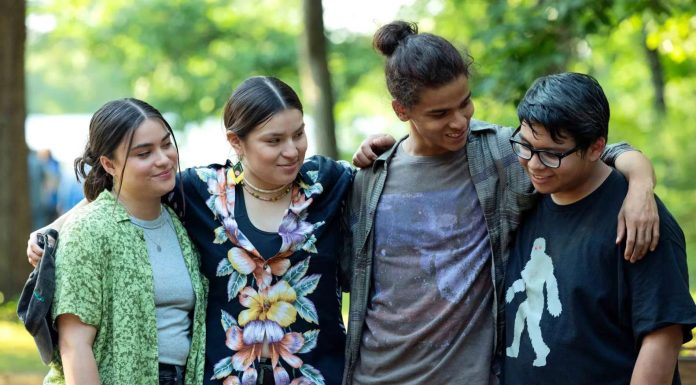Reservation Dogs Season 3 Episode 10’s Heartfelt Farewell: Few television shows have the ability to deeply impact viewers’ hearts in the storytelling genre. Reservation Dogs has had a significant impact on the field of Indigenous storytelling with its distinctive story and lively cast of characters. As we get into the recap of Reservation Dogs Season 3 Episode 10, “Dig,” we (tvacute.com) discover that we are at this moving crossroads between endings and beginnings.
The idea of the episode is straightforward yet incredibly poignant: the death of Old Man Fixico sparks a townwide funeral in Okern. But in keeping with Reservation Dogs’ genuine essence, this episode goes beyond the anticipated and explores themes of community, transformation, loss, and hope.
The revolutionary television series Reservation Dogs has been known for questioning the standards of Indigenous representation in American media. In addition to providing entertainment, the three-season run that began with the episode “Dig” cleared the path for a more accurate telling of Native American stories.
Reservation Dogs Season 3 Episode 10 Recap: “Dig”
The plot highlights the complex character dynamics and their responses to the loss by centering on the events following Old Man Fixico’s passing. It is up to Willie Jack to let Daniel’s mother Hokti know that Fixico (Josiah Wesley Jones) has passed away. Paulina Alexis and Lily Gladstone have outstanding performances that add to the scene’s emotional impact by providing a nuanced mix of sadness and laughter.
Hokti uses a deeply meaningful metaphor involving food to teach Willie Jack a lesson about community. The entire episode is woven together by this metaphor, which represents the individuals’ connections to one another and their common experiences. A major theme that emerges from both the story and the series’ overall message is the passing on of lessons and memories.
The funeral serves as a platform for exhibiting the range of responses and manifestations found within the community. The episode deftly strikes a mix between playful moments and the serious nature of the occasion, from Maximus getting back together with old pals to Mose and Mekko’s original homage in the form of a rap album. The aunts add humor and spice to the mix in their own peculiar ways, which reverberates across the entire series.
Character arcs and resonant messages: As Elora reveals her plans to leave Okern for college, the tension between her and Bear comes to the fore. Their turbulent relationship is masterfully wrapped up in this scene, which highlights the idea of understanding and evolution. Beyond the ceremonial parts of the funeral, the community literally digs Fixico’s grave, which adds to the emotional work of the event.
William Knifeman’s reappearance highlights the cyclical cycle of life and knowledge transfer while also adding another level of depth to the story. The development of Bear’s character over the series is embodied in his acceptance of shared leadership and his recognition of the strength of the group.
Reservation Dogs Season 3 Episode 10 Ending Explained!
The series ends with Fixico’s last resting place, but it doesn’t stop there. Instead, it moves into a thoughtful examination of what might come next. The funeral, a painful occasion that demands mental effort, becomes a symbol of the difficulties the community faces. The funeral director’s failure to supply shovels represents the outside barriers, but Kenny Boy and Ansel’s prompt arrival and legitimately sourced shovels represent the community’s inner strength to overcome these challenges.
The story deftly ties together significant social messages with the arcs of individual characters. Bear’s support of Elora’s desire to go to college represents how relationships can endure change, while Elora’s departure from college becomes a sign of development and advancement. The series’ influence on Indigenous storytelling is reflected in the masterful portrayal of the metaphorical passing of the torch from one generation to the next.
The reappearance of William Knifeman serves as a reminder that life and knowledge are perpetual cycles. The conversation between Bear and Knifeman emphasizes the value of teamwork in leadership and the power that comes from a strong sense of community. By breaking the fourth wall and addressing the audience directly, the show’s meta-commentary encourages viewers to identify and uphold the collaborative spirit that Reservation Dogs portrays.
Hope for the Future: The last montage shows the characters on their own adventures against the backdrop of Willie Jack bidding Fixico goodnight. Cheese visits Grandma Irene (Quannah Chasinghorse), Rita leaves for Oklahoma City, and Elora sells Mabel’s (Shelby Factor) house to pay for college. The certainty that these divergent pathways will eventually converge again emphasizes how resilient relationships formed in the face of difficulty can be.
There are rumors of spinoffs after the mid-credits sequence, which pays homage to the Seventies crew toasting “To the next one,” With its many layers of interpretation, this scene shows how the characters are embracing time’s inevitable passage as well as the possibility of further stories in the future. Beyond fiction, the symbolic passing of the torch resonates with the larger story of Indigenous representation in the media.
Reservation Dogs is a cultural icon rather than just a TV program. Native American depiction has always been restricted to stereotypes, but the series has elevated Indigenous storytelling and broken down those limits. The meta-narrative acts as a call to action, speaking directly to the audience and asking them to keep supporting Indigenous tales in all media, from indie cinema to literature.
It’s more than just the conclusion of a television series as we say goodbye to Reservation Dogs—it’s a celebration of everything it has achieved. As stated in the film’s concluding minutes, the intention is that Reservation Dogs’ momentum will help Indigenous artists advance toward a time when their tales are not just acknowledged but also appreciated.
Reservation Dogs Season 3 Episode 10 has created a finale that goes beyond the confines of traditional storytelling into the history of television. Not only is it a wrap-up, but it also opens up new possibilities for the story and the larger picture of Indigenous portrayal.
Conclusion
Reservation Dogs poignantly reminds us that stories, like the lives of the protagonists, don’t end on screen. These themes—the cyclical nature of life, the transmission of knowledge, and the power found in community—serve as compass points for the viewer as well as the characters.
Let’s pay attention to the need to support Indigenous storytelling as we consider the effects of Reservation Dogs. Whether via books, indie movies, or other media, it is our duty to make sure that the momentum created by this ground-breaking series serves as a trigger for long-term transformation. Even though Reservation Dogs has ended its trip, its cultural significance and storytelling prowess will continue to reverberate for years to come.
Will Reservation Dogs Season 4 Released?







